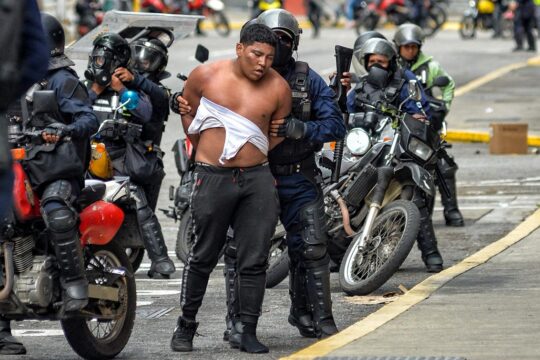Residents of a Peruvian border town, where a bridge cluttered with street vendors marks the frontier with Ecuador, believe new immigration restrictions will do little to halt a surging tide of Venezuelan migrants.
More than 2,500 migrants swamped the small crossing on Friday -- 10 times the usual daily traffic -- desperate to enter Peru hours before new restrictions come into force.
Thousands were also besieging the main Ecuador-Peru crossing at Tumbes, several kilometers (miles) away.
Local storekeepers and residents have backed the government's new entry restrictions for Venezuelans, which come into force at midnight on Friday, but fear it will only encourage traffickers to get involved.
Many Venezuelans fleeing economic chaos in their country arrive exhausted, some after spending 20 days walking, hitchhiking or packed with their belongings aboard overcrowded rural buses.
"The children are tired and dizzy because the trip has been quite complicated," Carolina Velandria told AFP as she arrived at the crossing on Friday.
The 36-year-old supermarket manager fled Venezuela with her children to join her husband, who reached Lima five months ago.
Peruvian officers handed out balloons to the children at the border crossing, but many fear it will be a different story on Saturday, when those without passports will be turned away under Peru's new entry rules.
Humanitarian workers believe only around half of Venezuelans on the move have passports.
"We have been on the road for five days. We traveled by bus and saw people, Venezuelans, walking along the road," Jonathan Zambrano, 18, told AFP.
Zambrano was traveling with 21-year-old Roxdaly Del Valle, who said he had left his civil engineering studies in Venezuela to take his chances in Peru.
- Trafficking concern -
Shops and stalls clutter both sides of the border, selling clothing, electrical goods and food.
"It's easy in these parts to enter the country, it's not like at other borders. You can go to the countryside, to the farms, and enter illegally," Luis Alberto Gutierrez said as he changed money at a table set up less than 100 meters from the crossing.
Some believe the Venezuelan exodus will encourage Mexican-style human trafficking in the area.
"We'll soon have the so-called 'coyotes,' who'll charge the Venezuelans to bring them to Lima and trick them," said Giannella Jaramillo at her clothes stall.
Jaramillo said that though many people wanted to help the migrants, there was still a fear they would cost Peruvians their jobs.
"On the one hand, we're sorry for the Venezuelan people, but they are taking a job away from a Peruvian," he said.
"It's hard to help more people."
Ecuador and Peru has seen a rise in Venezuelan migrants in recent days.
"Walk two blocks and you see 10 Venezuelans, walk another two and you see 10 Venezuelans," said Ecuadoran Gerardo Gutierrez, who crisscrosses the border selling mobile phone accessories.
"In economically poor countries, it's hard to help more people with what little there is," he added.
The Red Cross and UN refugee agency UNHCR have maintained a team here since April to try to help Venezuelan migrants.
"People arrive with very few resources and after having traveled, five or six days being the shortest. There are people who've been traveling for months," UNHCR's Regine de la Portilla told AFP.
fj/db/bc/oh



